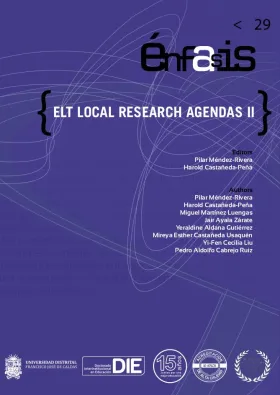
The chapters in this book describe studies that resist modernity and coloniality in the field of English as a world, foreign, additional, second language, English as a language existing in contexts where it functions as a lingua franca – or maybe not quite. They focus on the teaching-learning of English in Colombia, where it is not an ofcial language nor it is a must for intranational communication. In this book, the PhD students (and professors) at Doctorado Interinstitucional en Educación problematize the impacts of teaching-learning English to the subjectivities of non-native teachers and learners of English, considering regional policies for English teacher education that seem to emulate practices from the global north without much, if any, regard to local contexts. Some of them also struggle against the centrality of research methods and quality criteria set up by the global north, refusing to abide by their rules and thus making it explicit the violence inherent in established practices in the ELT field, whose research protocols, scientific methods, norms and characteristics of academic writing hide their situatedness and project themselves as purportedly global, international quality control systems.
It is high time we started a south-south dialogue in Latin America about our praxes as teachers of English. This book is an important step in that direction.
Subjectivity and Resistance Practices in the ELT Field
My research into Teachers’ struggles and resistance practices in Colombia has been shedding light on some actions teachers have taken to challenge and resist some practices (linguistic policies, standardization, certification).
Problematizing the Subject Position of the Observers in the ELT Field
This chapter explores the unseen, silencing and effective practices of invisibilization in the classroom observations made by the Ministry of Education- external institutions - of English teachers in public schools in Colombia.
Problematizing Local English Immersion Programs: Unpacking their Training Mechanisms
Colombian teachers of English (CTE) are overdiagnosed since we have always been judged to have a deficit perspective, based on international standards, like the Common European Framework of Reference (CEFR), which do not take into account the reality of our lives, (Ayala & Alvarez, 2005), kno
English Teachers’ Sites in the Diverse Lands of Peace
Peace-building and peace education: Each seems to respond to diverse ways of thinking about, feeling and resisting some phenomena in the world.
Reflections on the Relationship between (De)Colonialism(s) and Applied Linguistics in ELT
During the past five years, there has been a notable concern for decolonial studies in the Doctorado Interinstitucional en Educación program and the experiences of the students doing the major in ELT EDUCATION15.
The Influence of EFL Policies on the Work of Teachers in a Public Primary School
In this chapter, I discuss how my experiences as a student, teacher and coordinator led me to inquire into the way that ELT policies influence the work of teachers in public schools.
Teaching Across Cultures: The Negotiation and Reconstruction of Hybrid Teacher Identities in Colombia
This chapter aims to show the challenges faced by a small group of transnational teachers of English as a Foreign Language (ELF) in Colombia.
The Experiences of a Transgender Student in an Initial English Language Teacher Education Program
This chapter is mainly focused on what is happening, in universities, with the teaching of gender to pre-service teachers, specifically transgender issues.